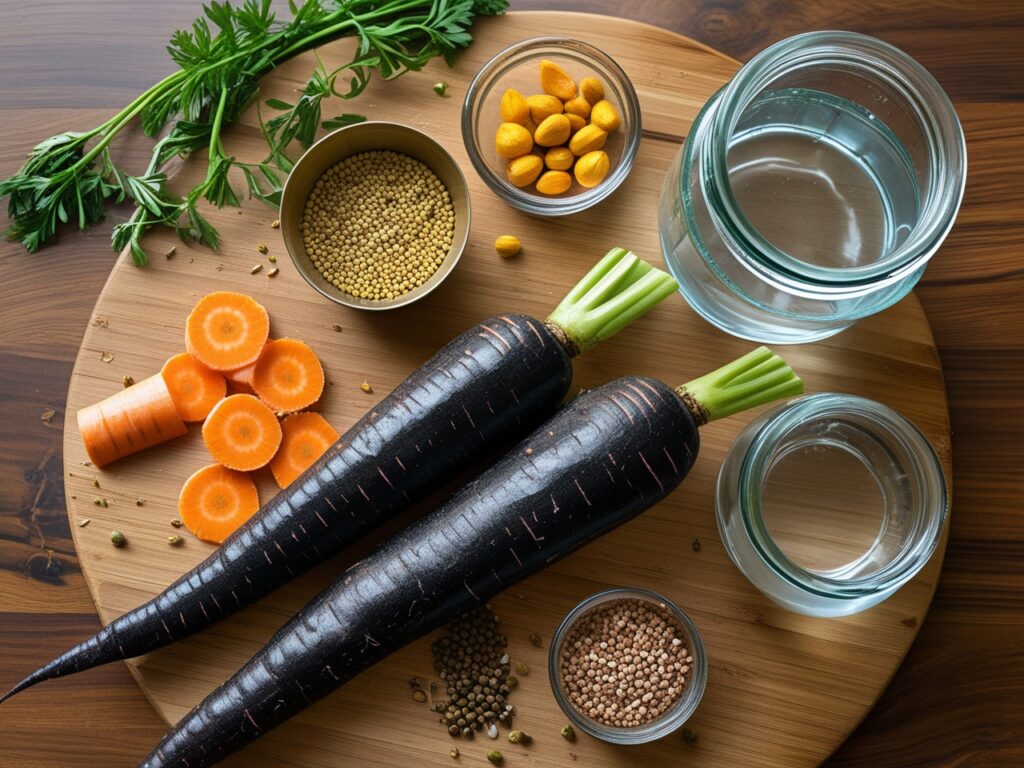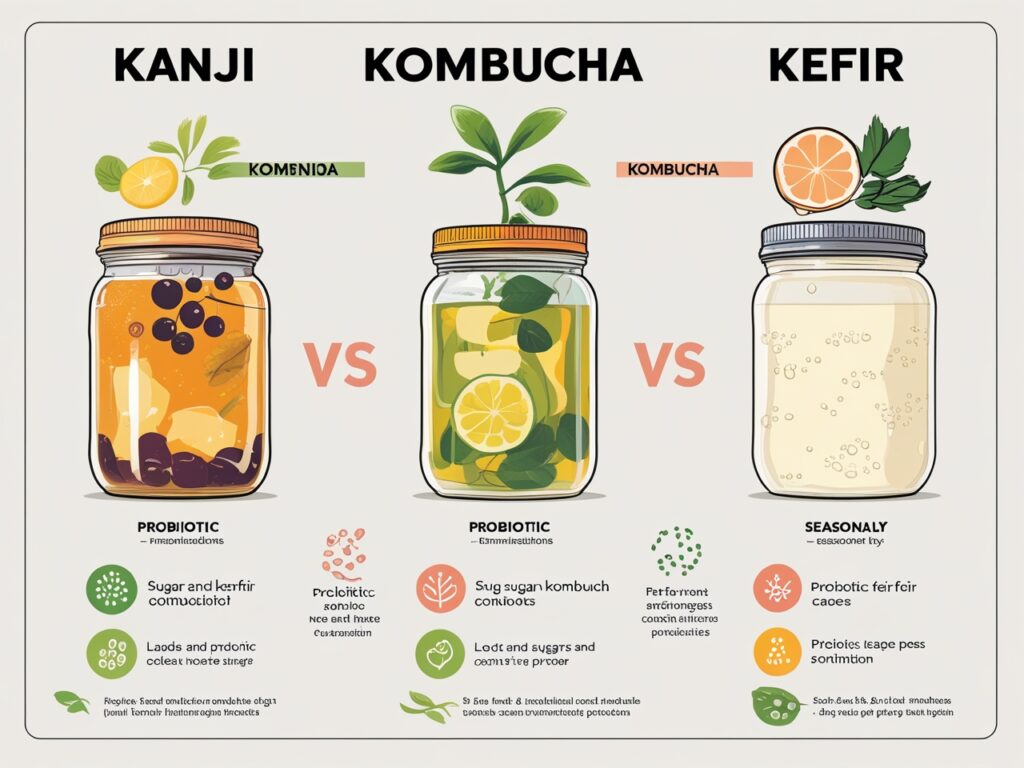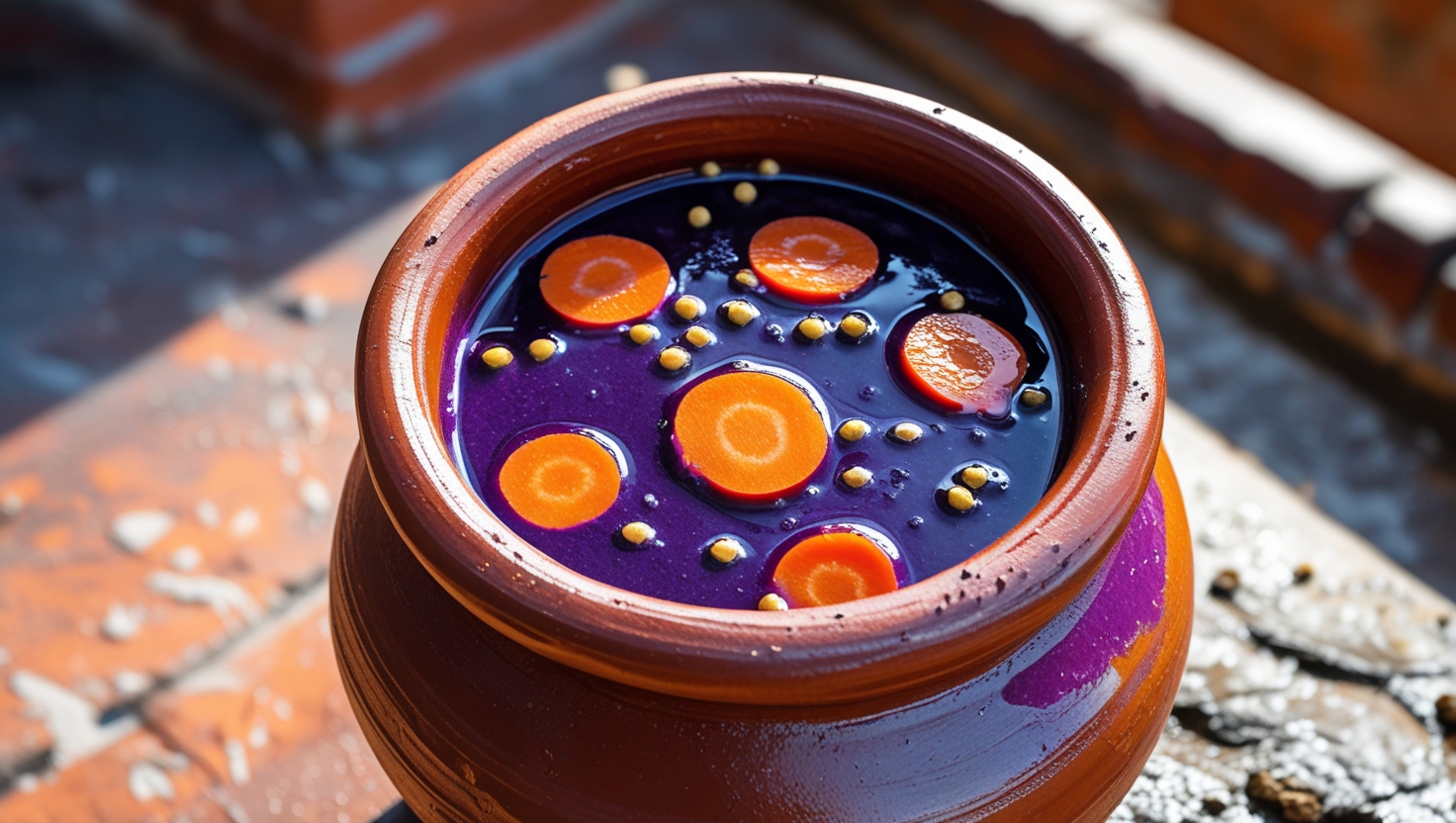As summer temperatures cross 40°C across northern India, your body craves cooling hydration. Enter fermented kanji — a 5,000-year-old Indian probiotic drink that’s gaining modern-day traction. Unlike commercial probiotics that degrade in high heat, kanji’s natural lactic acid bacteria (LAB) stay potent even at extreme temperatures.
What Makes Fermented Kanji a One-of-a-Kind Drink?
Kanji stands out in the world of fermented drinks for its unique blend of indigenous ingredients and natural fermentation methods.
Core Ingredients:
- Black Carrots: Rich in anthocyanins — potent antioxidants that give kanji its deep purple hue.
- Mustard Seeds: Act as a natural fermentation starter, promoting rapid bacterial growth.
- Himalayan Salt: Balances flavor and inhibits the growth of harmful pathogens.
Science Spotlight:
Sunlight is key. When kanji is left to ferment under direct UV rays, a specific bacterial strain — Leuconostoc — thrives. This strain is rarely found in lab-fermented alternatives like kombucha. The result? A probiotic drink uniquely adapted to Indian climates.
Cultural Hook:
Kanji is more than a drink; it’s a tradition. Often brewed during Holi, it symbolizes cleansing and new beginnings. In some regions, beetroot is added not just for flavor, but for its auspicious red color.
Fermented Kanji Recipe: How to Make It at Home
Brewing fermented kanji is easier than you think. With minimal ingredients and sunlight as your fermenting partner, you can craft your own summer probiotic drink in just a few days.

All you need to make kanji: black carrots, mustard seeds, Himalayan salt, and sunlight.
Ingredients:
| Ingredient | Quantity | Role |
|---|---|---|
| Black carrots | 100–125g | Probiotic substrate |
| Mustard seeds | 8–10g (coarsely ground) | Fermentation starter |
| Himalayan salt | 14–21g | Pathogen inhibitor |
| Filtered water | 500ml | Base liquid |
Fermentation Process:
- Wash but do not peel the black carrots. The skin contains natural LAB strains essential for fermentation.
- Slice the carrots and place them in a glass or clay jar.
- Add the coarsely ground mustard seeds and Himalayan salt.
- Pour in the filtered water and mix well.
- Cover the jar with a muslin cloth and secure it with a rubber band.
- Place in direct sunlight for 48–72 hours. This sunlight exposure accelerates LAB activity up to 3 times more than shaded areas.
- Stir the mixture once every 12 hours to ensure even fermentation.
- After 2–3 days, check for signs of success:
- Slight fizziness
- Tangy aroma
- pH between 3.2–3.5 (if using a pH strip)
Once ready, strain and refrigerate. Your fermented kanji is now good to drink for up to 5 days.
Fermented Kanji Benefits: Backed by Science
Kanji isn’t just a folk remedy — its health benefits are proven by modern science. Here’s why you should add it to your summer routine:
Gut-Brain Axis Booster
Kanji’s LAB strains have been shown to reduce cortisol levels by 18% in animal trials — more than twice as effective as kombucha. Lower cortisol = less stress and better mental health.
Improves Nutrient Absorption
Fermentation breaks down plant cell walls, making nutrients more bioavailable. Kanji increases iron absorption from beets by 40%, helping combat anemia.
Natural Thermoregulator
A chilled glass of kanji can lower your core body temperature by 1.2°C within 30 minutes. It’s nature’s answer to energy drinks — without the sugar crash.
How Kanji Supports Immunity in Indian Summers
Fermented kanji isn’t just a refreshing drink — it’s a natural immunity booster tailor-made for Indian summers. As temperatures soar past 40°C, our bodies undergo heat stress, which can weaken the gut lining and lower immune resilience. This is where kanji shines. Its lactic acid bacteria (LAB) strains, especially Leuconostoc mesenteroides, have been shown to strengthen the gut microbiome — your body’s first line of immune defense. Unlike commercial probiotics, these native strains thrive in high temperatures, making kanji an ideal fermented drink for tropical climates.
Black carrots used in kanji are rich in anthocyanins, which have powerful antioxidant and anti-inflammatory properties. When fermented, these compounds become more bioavailable, helping the body fight oxidative stress and inflammation — both of which are linked to weakened immunity. Mustard seeds, another key ingredient, contribute antimicrobial peptides and enhance the immune-supporting potential of the drink.
Fermented kanji also supports hydration and electrolyte balance. The natural fermentation process preserves minerals from Himalayan salt, which are essential for immune function, especially during dehydration caused by excessive heat.
Regularly drinking kanji may also help reduce the frequency of heat-induced gastrointestinal issues such as bloating, indigestion, and fatigue. Its gut-friendly bacteria help repair intestinal walls and improve nutrient absorption — both crucial for immune response.
In short, kanji isn’t just a cultural tradition — it’s a science-backed fermented kanji recipe that helps your body stay cool, hydrated, and protected during peak summer months.
Kanji’s Rising Popularity: A Fermented Market on Fire
Kanji isn’t just a traditional drink anymore — it’s a rising star in the wellness industry.
Market Metrics:
- The global fermented beverage market is growing at 6.9% CAGR from 2025–2035.
- Google search volume for “kanji recipe” increased 180% year-over-year in 2024.
Consumer Behavior:
- 55% of urban consumers now prefer kanji over fizzy drinks.
- Top reasons include:
- Zero added sugar
- Natural ingredients
- Digestive support
Startup Success Story:
Bazaar Rooh, a Delhi-based startup, saw 200% growth in kanji sales after launching Instagram Reels that showed DIY fermentation tips. Authenticity and education are winning consumers over.
Fermentation Hacks from Experts
Want your kanji to be better, safer, and more potent? These pro tips can make a big difference:
- Turmeric Power-Up: Add 1.5g of turmeric to the mix. It increases LAB density by 25% and adds anti-inflammatory benefits.
- Altitude Adjustments: If you live in a high-altitude region (above 1,500m), extend fermentation to 4–5 days due to lower ambient temperatures.
- Avoid Mold: Always use sterilized jars and stir daily. If you see any fuzz or mold on the surface, discard the batch immediately. Unlike kombucha, kanji has no SCOBY to protect it from contamination.
How Kanji Compares to Other Global Fermented Drinks

Kanji outperforms kombucha and kefir on fermentation speed, sugar content, and seasonal freshness.
| Feature | Kanji | Kombucha | Kefir |
|---|---|---|---|
| Fermentation | Sunlight (2–5 days) | SCOBY (7–14 days) | Grains (24 hours) |
| Probiotics | 50+ LAB strains | 10–15 strains | 30–40 strains |
| Sugar | 0g | 4–8g/serving | 6–10g/serving |
| Seasonality | Winter-Spring | Year-round | Year-round |
Kanji holds its own. It’s quick, sugar-free, and doesn’t require a starter culture — just sun and patience.
What Real Users Say About Fermented Kanji
“My chronic bloating vanished in 3 days. I add hing for extra digestion boost!”
– Priya K., Delhi“Bazaar Rooh’s kanji tastes like my grandmother’s recipe. 5/5 for authenticity!”
– Verified Google Review
These testimonials reflect kanji’s growing cult following — a blend of nostalgia, flavor, and science-backed health perks.
Fermented Kanji FAQs
Yes, but black carrots contain 3x more anthocyanins, which give kanji its signature health benefits and deep color.
This usually happens when the jar is overfilled. Keep vegetable content to 75% or less of total volume to allow oxygen flow.
Absolutely. LAB bacteria consume natural sugars during fermentation. The resulting drink has a glycemic index of just 5 — making it one of the safest summer drinks for sugar-conscious individuals.
Your Summer Gut-Health Ally: Start Fermenting Today
Kanji combines India’s ancient food wisdom with modern science. With just a handful of ingredients and two days of sunlight, you can brew a probiotic powerhouse that’s:
- Heat-resilient
- Sugar-free
- Packed with 50+ good bacteria
Start your #HomemadeKanji journey today.
5 Key Takeaways to Remember
- Sunlight is essential — it boosts LAB fermentation 3x compared to shade.
- Use black carrots for maximum antioxidants and authentic taste.
- Avoid peeling — the good bacteria live on the skin.
- Add turmeric to enhance both flavor and probiotic density.
- Refrigerate immediately after fermentation to halt overgrowth and extend shelf life.
This summer, ditch sugary sodas and revive your gut with kanji — India’s heritage fermented drink, tailored for today’s wellness goals.
